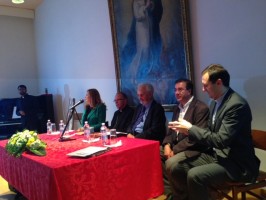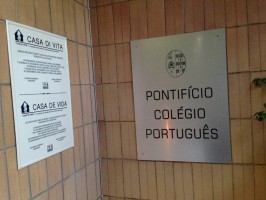In a commemorative ceremony held on May 30, 2017, the Raoul Wallenberg Foundation declared the Pontifical Portuguese College as “House of Life” for its solidarity and civic courage during the Holocaust. In this Catholic institution, shelter, food and medicines were provided to Jews persecuted by Nazism and its allies. In the presence of representatives of the NGO presided by Eduardo Eurnekian, of his eminence, the Cardinal Patriarch of Lisbon, senior officials of the Portuguese clergy, members of the diplomatic corps, the current rector Monsignor José Fernando Caldas Esteves and personalities related to the university, Silvia Costantini, Vice President of the Raoul Wallenberg Foundation, read a speech delivered by the Roman Jewish community president, Ruth Dureghello, and presented the plaque “House of Life”.
During the event, the courage of Father Joaquim Carreira, vice-rector of the College from 1943 to 1944 was recalled. Thanks to his actions, more than 50 refugees persecuted by the fascist Nazi regime were able to avoid death.
The recognition also had the presence of Luigi Priolo, a witness of those times in the Portuguese Pontifical College between December 1943 and June 1944, six months in which he lived with Father Carreira and knew his extraordinary personality.
 Silvia Constantini, Cardinal Manuel Clemente, Luigi Priollo, Antonio Marujo, Don Fernando Calvas Esteves.
Silvia Constantini, Cardinal Manuel Clemente, Luigi Priollo, Antonio Marujo, Don Fernando Calvas Esteves.The profile of Father Carreira is described in the book by Antonio Marujo, a Portuguese writer who was also present at the ceremony with his new book, “La lista del Padre Carreira” (Padre Carreira´s List). The book describes stories and episodes of refugees in the Portuguese Pontifical College during the period of fascism, highlighting the extraordinary heroism of the priest posthumously named “Righteous Among the Nations.”
The ceremony had extraordinary media coverage.
http://it.radiovaticana.va/news/2017/05/31/riconoscimento_al_pontificio_collegio_portoghese/1315891
“Houses of Life” programme marks with commemorative plaques public and private locations, including convents, monasteries, churches, schools, homes, in which people persecuted by Nazism and their allies found refuge. After more than 70 years of the end of World War II, the proposal aims to thank those who stood up in the front line and risked everything, even their own lives, to help others.
To date, around 500 religious locations have been located throughout Europe. These refuges are, almost all, churches, convents, monasteries, colleges and Catholic boarding schools. In them lives were saved by giving shelter, education and food, to thousands of persecuted by Nazism and its allies. Plaques have already been placed in religious institutions in Rome, Florence, Leonessa, Lastra a Signa, Copenhagen, Paris and Ereikousa island, in Greece. Soon it will be the turn of institutions in Poland, Belgium and Hungary.
Recently, Eduardo Eurnekian, chairman of the IRWF, discovered the plaque that declared the Istituto delle Suore di San Giuseppe (Institute of the Sisters of St. Joseph) as “House of Life”, also in Rome.
VIDEO OF THE CEREMONY

